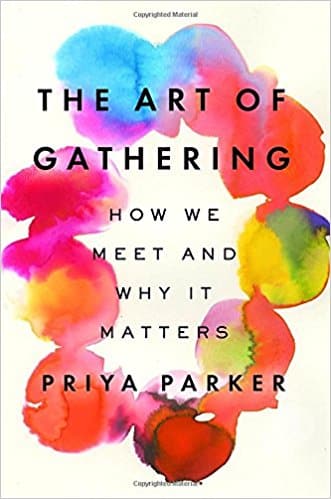When The Art of Gathering is Ending
There are gatherings that seem like they will never end, those at which I find myself sitting in a corner with my legs crossed, checking my watch, then crossing my legs the other way. Plenty of people are still having a nice time, but I am done. And then there are those gatherings that a person might wish would go on and on. At the end of one week of summer camp as a junior higher, I was so beside myself at having had to say goodbye to a particular counselor that I spent the next several weeks writing letters to my relatives who lived in nearby towns, hoping they might be able to find me an address for the person in their phone books. Of course, I could easily have asked the counselor for this detail before departing from camp, if I’d been willing to admit I wanted it.
Endings and reentry can be hard.
Reentry, in the context used by Priya Parker in The Art of Gathering, is more typically experienced after an “intense experience within the bubble of a dialogue” or for “soldiers returning from war or prisoners finishing their sentences”; it is often a reflection of the challenges of ending an experience together where a group has bonded, particularly when removed from their ordinary surroundings. But she notes that there can be an element of reentry “even in the most ordinary comings-together.” No matter how commonplace the gathering, she says, “if you have forged a group and created something of a temporary alternative world, then you should also think about helping those you gathered ‘take the set down’ and walk back to their other worlds.”
How we close our gatherings is one of the most important parts of the entire event. Parker tells the story of musician Neo Muyanga saying the last four pages of the score is the “second-most-important” part of the opera. (The first-most-important is the first 16 bars.) Muyanga says that “this is where the composer must have, once and for all, justified the first notes sung and played by the ensemble and where the conductor needs to push the entire alternate universe—the one that has recently been magically conjured up—over the edge of the abyss, leaving the listener to fall back into their own skin.”
I am happy to say I have never hosted (nor attended) a gathering in which anyone had need to return to their skin. But Muyanga’s point is well taken. Says Parker, “great hosts, like great actors, understand that how you end things, like how you begin them, shapes people’s experiences, sense of meaning, and memory.” It’s our job, she explains, to help guests “close that temporary world, decide what of the experience they want to carry with them, and reenter all that from which they came.”
So then, how to end well? Parker suggests one key to a good ending is to “just accept it.” She recommends avoiding the temptation to try to prolong a gathering beyond when it should have ended, leaving folks tired and sometimes feeling awkward. When we push our gatherings to the too-far point, Parker says, “we are not only living in denial, we are also depriving our gathering of the kind of closing that gives it the chance of enduring in people’s hearts.” I’ve long practiced a rule of leaving an event while it’s still fun, knowing that if I wait too long I’ll be leaving because it’s no longer fun. Of course, I had no idea I was following the model of Queen Elizabeth’s party planner, whose rule was to end a party “while there were still 20 people on the dance floor.”
Another tip is to mirror the bartender tradition of “last call,” which can be seen not as much as a closing as the “beginning of an outbound ushering.” The last call in our gatherings is a preparatory step, letting people know the end is near, while still leaving space to order one more round while they bring themselves to that ending place.
Parker outlines the two essential phases of a strong closing: looking inward and turning outward. “Looking inward,” she explains, “is about taking a moment to understand, remember, acknowledge, and reflect on what just transpired.” On the other hand, turning outward is “about preparing to part from one another and take your place in the world.” In many cases, this can be done with a bit of ceremonial flair, from the poems, readings and confessions of one group’s “If These Were My Last Remarks” closing to passing out a party favor as a memento of the event and a means to renew the sense of bonding and community that took place.
One of the classes I teach is a program where the participants all work for the same company. Some work in the same office, while others might work in different offices or even in different markets. They spend two weeks with us in intensive classroom learning, climbing roofs, and showing their work in front of the whole group for an hour of in-depth critique. We laugh a lot, we eat some of our meals together, and we endure together the frustrations of people being tired, jet lagged, away from home, physically challenged, and sometimes in over their heads. By the end of class, there’s been a certain kind of bonding that has taken place. On the final day, we bring in breakfast and do one more review before they begin their final project. We give any last announcements that need to be made, and we all get up on the roof for a group photo. And then they begin their project. Several hours later, as one by one they complete their work and prepare to leave, we collect any tools and materials that belong to us, and send them into the hall. Once they’re out the door, we turn on “Pomp and Circumstance,” display falling confetti on the projector screen and bring them back into the room to march to the front, where we make mock graduation pronouncements and give them their certificate of completion of the course.
About half the time, the student will burst out laughing when they come in. The other half, they’ll roll their eyes. But when they’re motioned forward, all but a very few will begin to dance and groove their way to the front, mugging for the camera all the way.
Parker says that “whatever your final moment is, it should be authentic and make sense in your context.” By this time, our students can’t wait to get in the Uber to take them to the airport. This final moment of silliness and ceremony is the perfect reflection of the yin and yang of our class, a mix of seriousness and fun, allowing our attendees to cross the “exit line” with a sense of accomplishment and delight, celebrating the work we’ve accomplished together.
***

Announcement Post
June 13: Chapters 1-3
June 20: Chapters 4-6
June 27: Chapters 7-8
No matter what kind of gatherings you’re a part of—dinner parties, business meetings, birthdays, conferences and more—gather here with us first, and let’s rethink together.
Buy The Art of Gathering now
Listen to Krys Boyd’s interview with Priya Parker on Think
Photo by Nathalie, Creative Commons license via Flickr. Post by LW Lindquist.
- Earth Song Poem Featured on The Slowdown!—Birds in Home Depot - February 7, 2023
- The Rapping in the Attic—Happy Holidays Fun Video! - December 21, 2022
- Video: Earth Song: A Nature Poems Experience—Enchanting! - December 6, 2022

Bethany R. says
I appreciate this attention to closing. Makes me think about how thoughtful endings can even make a notable difference in everyday correspondence. Not everything needs to be carefully worded, but I have to say there have been emails that left me grinning because of the send-off.
Warmly,
Bethany
Laura Lynn Brown says
One of the best closes I can remember:
When I was in grad school I attended a reading by Allen Ginsberg. At the end, he sang William Blake’s poem “The Nurse’s Song,” a call-and-response poem. The nursemaid is telling children the sun has set and it’s time to come in. The children say it’s still day because it’s still light out. Nurse says, well, come to bed when the light has faded. It is, in short, about not wanting to leave the party, not wanting a good thing to be over.
I almost didn’t get in because so many people had come, more than the auditorium could hold according to the fire code. Campus security people locked the doors to the building. An acquaintance inside the lobby managed to convey to me through the glass wall that they were probably going to let 20 more people in. After most of the disappointed outsiders left, the doors opened briefly. We sat on the steps in the aisle. He was captivating.
He knew, of course, that his reading was an experience that some people wouldn’t want to be over. He sang that old poem to a tune he’d composed, and played a concertina. Just as great entertainers sometimes do at the end of concerts, he invited us to sing along, even to harmonize, with a whole verse or two made of the second verse’s last line, “And all the hills echo-ed.” We sang; some of us tested various harmonies; he brought it in for a landing. And we left that auditorium and re-entered the night with that line echoing in our minds, resonating in our own skins.
The next night I went to another auditorium for the concert portion (sort of a variety show) of a multimedia art event. The young guy who emceed it had been to Ginsberg’s reading, and he was still full of the magic of it. He tried to recreate it, and possibly to open this gathering with a bonding moment, by having us all sing that last line repeatedly again. But everything about it was out of context. It fell flat and I think people felt embarrassed for him.
On the first day of my classes at Pitt, I have the students brainstorm answers to something about our course content (say, “What counts as writing for the public?”) and write the answers on the board. On the last class meeting, I ask three questions and write their answers on the board:
• If this course had a highlights reel, what would you put on it?
• A bloopers reel?
• What’s one takeaway from this course?
It’s a rough draft for their end-of-course self-evaluations; it reflects back to me what worked well and what didn’t, or what was challenging in a good way; and it allows us to think back over the arc of our time together and bring it to a close. On that last question, they’re sort of choosing their own parting gift from the buffet of the semester. (In the class that ended in December, I also gave them a finals week parting gift — a snowflake-print Ziploc with a pocket pack of Kleenex, some Vitamin C drops, a packet of cocoa mix and a pencil).
Endings are hard. You don’t want to miss something good; you don’t want to overstay your welcome. And if it has been really good, you want to hold onto it, sometimes too tightly. One thing that intrigued me from this week’s reading was the discussion of how uncomfortable many of us are with death, with discussing it and acknowledging its reality and finality, hence the trends toward a “celebration of life” instead of a funeral.
Megan Willome says
LW, I love the way you end your two-week program!